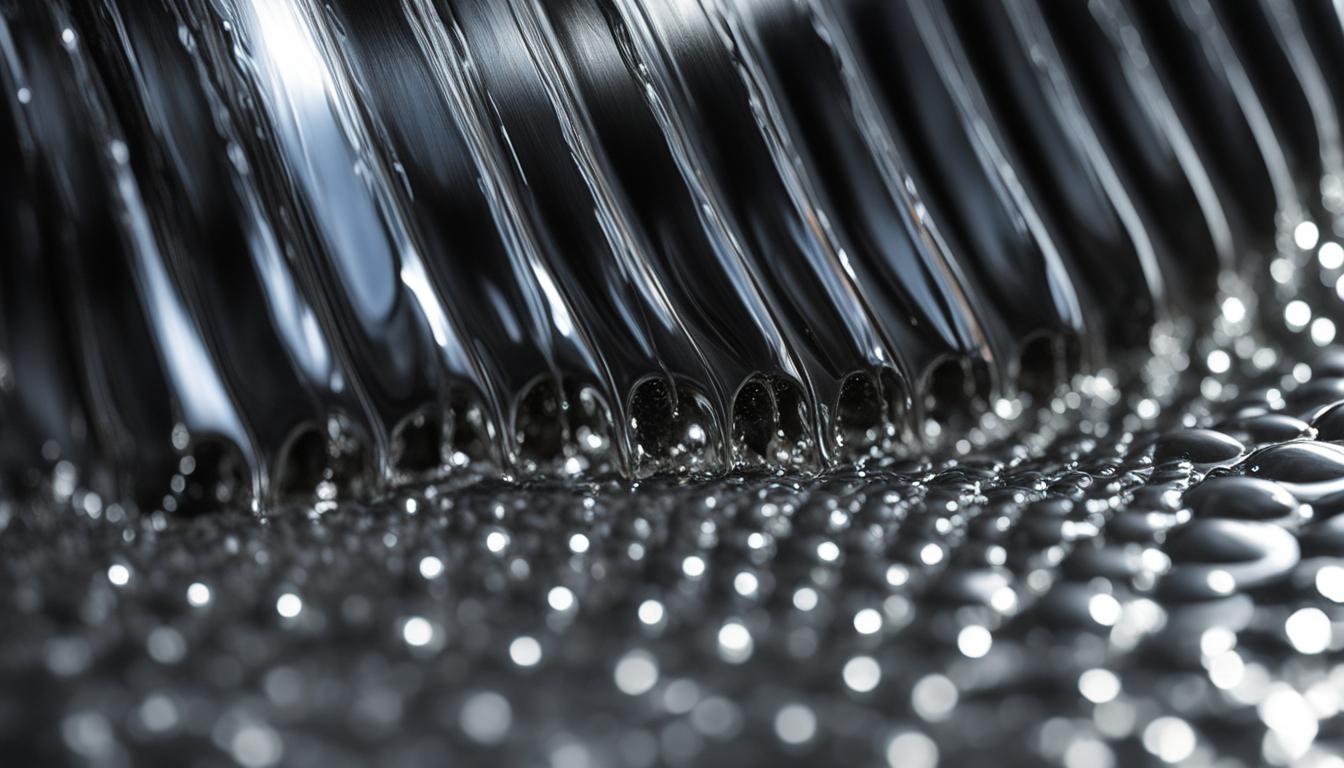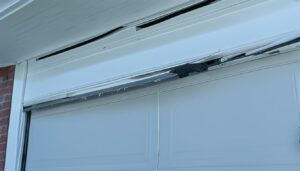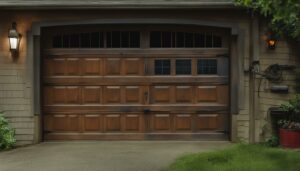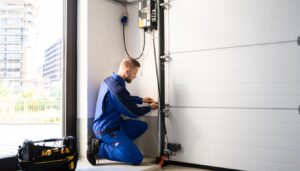Garage doors are a vital part of daily life for many homeowners, serving as the main entry and exit point of the house. Proper lubrication for garage doors is essential to ensure the smooth operation and longevity of garage doors. Lubrication helps reduce stress on the door components and prevents material removal and debris accumulation. When selecting a garage door lubricant, it is important to choose the right type of product. Silicone-based lubricants, despite their popularity, can potentially damage the paint of cars. On the other hand, petroleum-based lubricants, such as white petroleum grease, are recommended for metal parts due to their weather-resistance capabilities and durability. Garage door lubricants can come in various forms, including greases, sprays, oils, and foams, with each form suitable for different door components. The preferred garage door lubricant is the King Door Heavy-Duty Garage Door/Operator Lubricant and Rust Prevention Spray, designed specifically for garage door maintenance. Applying proper lubrication to garage doors is crucial for smooth operation, just as weatherstripping is essential for energy efficiency and protection against the elements.
Optimal lubrication is a key factor in ensuring the smooth and efficient operation of garage doors. From reducing friction to preventing rust and corrosion, selecting and applying the right lubrication products can significantly extend the lifespan of your garage door system. This guide explores the importance of lubrication for garage doors and provides essential tips for choosing the best products for your specific needs.
Proper lubrication not only enhances the performance of garage doors but also minimizes wear and tear on components, leading to fewer repair costs and maintenance issues over time. Whether you have a traditional overhead door or a modern automatic system, understanding how to lubricate your garage door correctly is essential for maximizing its functionality and longevity. Join us as we delve into the world of optimal lubrication for garage doors and empower you to make informed decisions for your home or business.
Key Takeaways:
- Proper lubrication is essential for the smooth operation and longevity of garage doors
- Silicone-based lubricants can potentially damage car paint, while petroleum-based lubricants are recommended for metal parts
- Garage door lubricants come in various forms, including greases, sprays, oils, and foams
- The King Door Heavy-Duty Garage Door/Operator Lubricant and Rust Prevention Spray is a preferred choice for garage door maintenance
- Selecting and applying the right lubricant is crucial to ensure optimal garage door performance
How to Lubricate a Garage Door
Maintaining a smoothly functioning garage door is crucial for convenience and safety. One of the key maintenance tasks is lubricating the various moving parts regularly. Proper lubrication not only reduces friction and wear but also helps to minimize noise and prolong the lifespan of your garage door system. In this guide, we’ll explore the step-by-step process of how to lubricate a garage door effectively. Whether you’re a seasoned DIY enthusiast or a beginner looking to take care of your home, mastering this simple yet essential task can save you time, money, and potential headaches down the road.
Lubricating a garage door is a crucial maintenance task that ensures smooth and efficient operation. By following a simple checklist and using the right materials, you can keep your garage door in optimal condition for years to come.
Garage Door Lubrication Checklist
Before you begin lubricating your garage door, make sure to gather the necessary materials:
- Garage door lubricant (preferably silicone-based or white lithium grease)
- Rag or cloth
- Wrench or socket set
- Ladder
Once you have everything you need, you can proceed with the lubrication process:
- Tighten all parts: Use a wrench or socket set to ensure that all bolts and screws on your garage door are tight. Loose parts can cause unnecessary vibrations and noise.
- Inspect and lubricate the springs: Check the garage door springs for any signs of wear or damage. Apply a small amount of lubricant to the springs, focusing on the coils and pivot points.
- Lubricate the rollers: Apply the lubricant on the inside of the roller where the wheel bearing sits. This will ensure smooth rolling and prevent any squeaking or grinding noises.
- Lubricate the hinges: Apply lubricant to the hinges to ensure smooth folding and unfolding of the door panels. Be sure to cover all moving parts of the hinges.
- Lubricate the locks: Apply lubricant to the lock mechanism to prevent sticking or freezing. Use a rag or cloth to wipe away any excess lubricant.
After completing these steps, test the door’s movement to ensure it operates smoothly. Lubrication should be done every six months to maintain optimal performance.
Benefits of Using Garage Door Lubricant
Garage door lubricant offers numerous benefits that can enhance the performance and longevity of your garage door system. Proper lubrication reduces friction between moving parts, leading to smoother and quieter operation. It also helps prevent wear and tear on components, extending the lifespan of your garage door. Additionally, using the right lubricant can improve the overall safety of your garage door by ensuring that all parts move freely and without resistance.
Regularly using a garage door lubricant offers several benefits. Lubrication helps reduce noise levels by minimizing metal-to-metal contact, resulting in a quieter garage door operation. It also ensures smooth operation by reducing friction between moving parts, allowing the door to open and close more efficiently. The use of lubricant helps prolong the lifespan of the garage door and prevents unnecessary stress on essential components such as springs, rollers, and hinges. Additionally, lubricating the door can address volume-related issues and improve the speed of operation.
| Benefits | Explanation |
|---|---|
| Quiet Garage Door Operation | Lubrication reduces metal-to-metal contact, reducing noise levels during door operation. |
| Smooth Garage Door Operation | By minimizing friction, lubricant ensures smooth and efficient opening and closing of the door. |
| Extended Lifespan of Garage Door | Regular lubrication prevents unnecessary stress on components and extends the overall lifespan of the garage door. |
| Volume Reduction | Applying lubricant can address volume-related issues, making the door operation quieter. |
| Reduced Friction | Lubrication reduces friction between moving parts, allowing for smoother door operation. |
| Protection of Essential Components | The use of lubricant prevents wear and tear on components such as springs, rollers, and hinges, protecting them from damage. |
To enhance the performance and longevity of your garage door, regular lubrication with a high-quality garage door lubricant is essential. The benefits of using such lubricants include a quieter operation, smoother movement, an extended lifespan for your garage door, reduced volume during operation, less friction between parts, and increased protection for essential components. By incorporating regular lubrication into your maintenance routine, you can enjoy a noise-free and efficiently operating garage door for years to come.
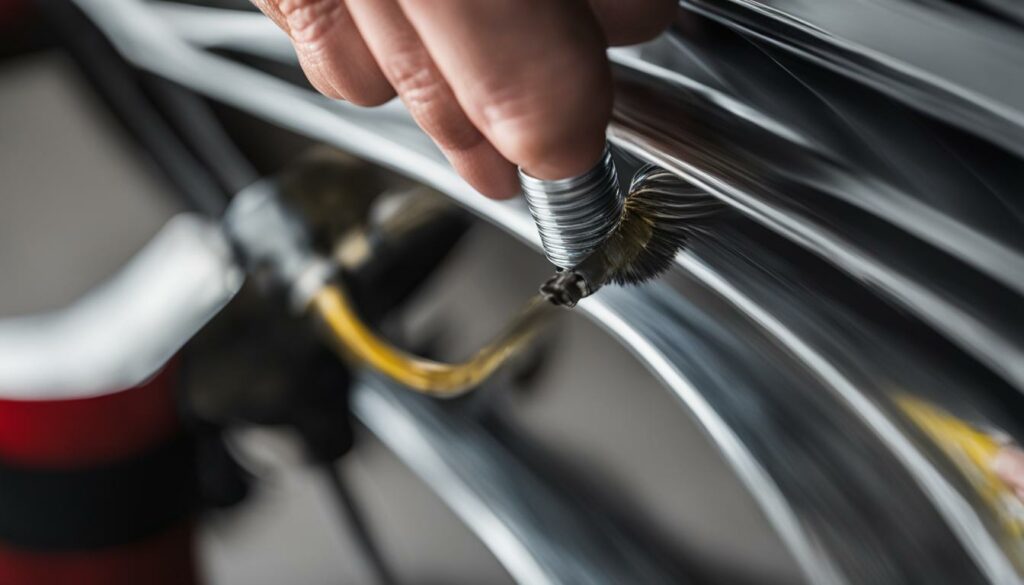
General Tips of Lubrication for Garage Doors
Proper lubrication is essential for maintaining the optimal functioning of your garage door. Follow these garage door lubrication tips to ensure smooth and efficient operation:
- Frequency of Lubrication: Lubricate your garage door every six months to keep it running smoothly. Regular maintenance is key to preventing wear and tear on the door components.
- All-Weather Products: Use an all-weather lubricant that can withstand temperature changes. This will prevent the lubricant from becoming too thick or thin, ensuring consistent performance in varying weather conditions.
- Lubrication in Cold Weather: Cold weather lubrication is particularly important to prevent brittleness and breakage of the door springs. Make sure to apply the lubricant specifically designed for cold temperatures.
- Choosing the Right Lubricant: When selecting a lubricant, opt for silicone sprays or white lithium grease. These products adhere well to metal surfaces and provide long-lasting lubrication. Avoid using standard degreasers, mechanic’s grease, or engine oil, as they can attract dirt and dust, leading to potential damage.
By following these garage door lubrication tips, you can ensure the smooth and efficient operation of your garage door. Regular lubrication helps to reduce friction, extend the lifespan of your door, and prevent unnecessary repairs. Don’t forget to consult the manufacturer’s recommendations for specific lubrication instructions for your garage door model.
Garage Door Lubrication Tips: At a Glance
| Tip | Description |
|---|---|
| Frequency of Lubrication | Lubricate your garage door every six months to maintain optimal performance. |
| All-Weather Products | Choose lubricants that can withstand temperature changes for consistent performance. |
| Lubrication in Cold Weather | Use lubricants specifically designed for cold temperatures to prevent damage. |
| Choosing the Right Lubricant | Opt for silicone sprays or white lithium grease for metal surfaces. Avoid using standard degreasers, mechanic’s grease, or engine oil. |
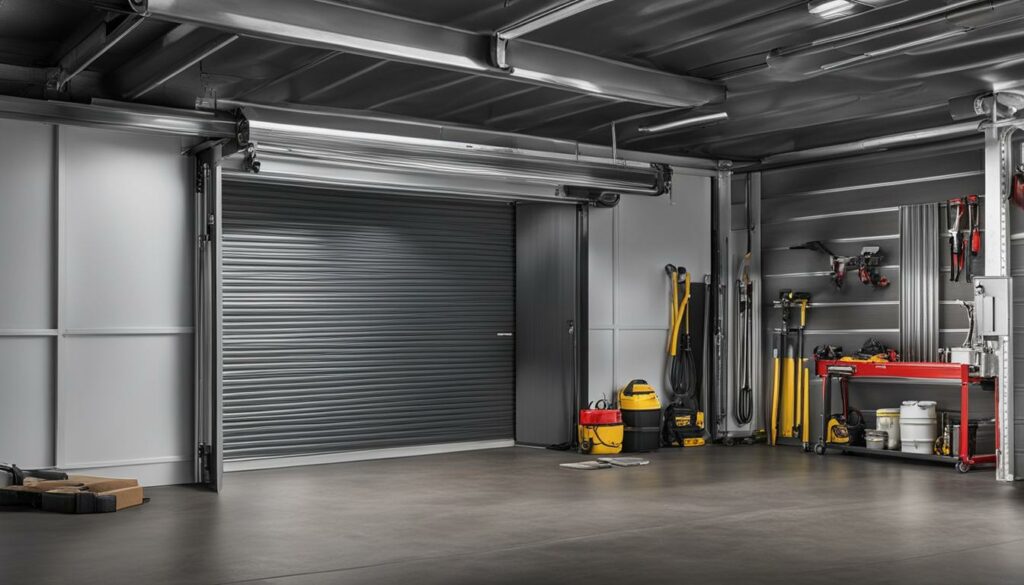
How to Maintain a Quieter and Efficient Garage Door
To ensure your garage door operates smoothly and quietly, regular maintenance and proper lubrication are key. By following a pre-lubrication maintenance checklist, you can address any potential issues and keep your garage door in optimal condition.
Start by inspecting and tightening all parts of the door, including hinges, rollers, springs, and the garage door opener chain. Check for any signs of wear and tear, such as loose bolts or excessive noise when opening or closing the door.
Next, focus on lubricating the moving parts of the door. Apply the appropriate lubricant to the hinges and rollers, ensuring they glide effortlessly. Don’t forget to lubricate the armbar and lock as well, as this will allow for smoother operation and reduce noise.
When it comes to selecting the right lubricant, opt for silicone sprays or white lithium grease. These lubricants offer long-lasting protection, adhere well to metal, and help reduce friction, resulting in a quieter and more efficient garage door.
FAQ
Why is lubrication important for garage doors?
Lubrication is important for garage doors because it helps reduce stress on the components, prevents material removal and debris accumulation, and ensures smooth operation and longevity.
What type of garage door lubricant should I use?
It is recommended to use petroleum-based lubricants, such as white petroleum grease, for metal parts. Silicone-based lubricants can potentially damage car paint.
What forms do garage door lubricants come in?
Garage door lubricants can come in various forms, including greases, sprays, oils, and foams, with each form suitable for different door components.
How do I lubricate a garage door?
To lubricate a garage door, follow a checklist that includes tightening all parts, inspecting and lubricating the springs, lubricating the rollers, hinges, and locks, and testing the door’s movement after lubrication.
What are the benefits of using garage door lubricant?
Using garage door lubricant reduces noise levels, ensures smooth operation, prolongs the lifespan of the door, prevents stress on essential components, and improves the speed of operation.
How often should I lubricate my garage door?
It is recommended to lubricate a garage door every six months to maintain optimal functioning. Cold weather lubrication is especially important to prevent brittleness and breakage of the door springs.
What are some general garage door lubrication tips?
Use all-weather products, choose the right lubricant such as silicone sprays or white lithium grease, and avoid using products like standard degreasers, mechanic’s grease, and engine oil.
How can I maintain a quieter and more efficient garage door?
Regular maintenance is essential, including inspecting and tightening all parts, lubricating hinges and rollers, and using appropriate lubricants. Following a pre-lubrication maintenance checklist will help reduce noise and ensure smooth operation.

